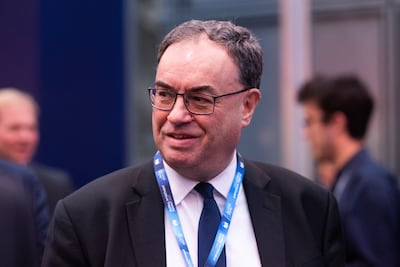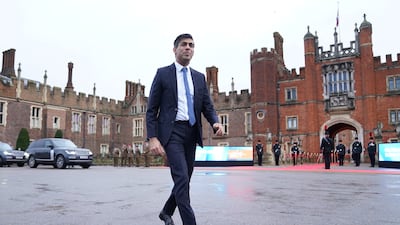As he sat amid the splendour of Hampton Court on Monday, Rishi Sunak could be forgiven for harking back to previous occupants of the royal palace. They had a way of dealing with recalcitrant advisers – they would have silenced Andrew Bailey.
On the very day world business leaders had been summoned for the Prime Minister’s Global Investment Summit, to hear why the UK was the best place for them to invest, the Bank of England Governor lobbed a grenade from the sidelines.
He’s done it before, delivering a dose of negativity – his supporters would hail it as reality – to puncture the boosterish claims of politicians. This time, though, seemed worse.
Partly it was the grandeur of the occasion. Sunak, his Chancellor Jeremy Hunt and Business Secretary Kemi Badenoch, and their officials, had been planning this for months. The bosses of Goldman Sachs, Blackstone, Aviva and JP Morgan Chase and the Saudi Arabia Public Investment Fund, among many others, had accepted invitations to attend.
They were greeted by buglers, a red carpet and a line-up of gleaming, British-made Aston Martin and McLaren sports cars.
After last week’s Autumn Statement cut taxes for business, this was a show of confidence and power, promoting Britain’s past, its lead down the centuries in science and innovation, and inviting today’s crop of corporate titans to share in the country’s future.

Meanwhile, hundreds of miles from the razzmatazz, in the industrial North-East, Bailey was telling the Newcastle Chronicle: “If you look at what I call the potential growth rates of the economy, there’s no doubt it’s lower than it has been in much of my working life. It does concern me that the supply side of the economy has slowed. It does concern me a lot.”
For Bailey, read Thomas More, the 16th century Lord Chancellor martyred on the orders of King Henry VIII, whose favourite citadel was Hampton Court.
The symbolism of Bailey giving an interview to a local paper rather than the delegates’ global favourites of the Financial Times and Wall Street Journal or Bloomberg, the timing, and his use of stark language – these pointed, said his critics, to a deliberate act of sabotage.

But there was no reason why he should mind his words for the sake of undermining the PM’s big moment. He’s independent after all, and nothing would highlight that fact more than this.
That could, perversely, give some comfort to potential investors.
As Stephen Schwarzman, head of private equity group Blackstone, pointed out to a listening Sunak et al, Britain has had four prime ministers and six chancellors since 2019. “Something that people in the government may not be as sensitive to is that people like us need consistency. We need to be able to trust what’s going to be happening.”
In that sense, Bailey, in charge at the Bank of England since 2020, provides assurance and stability. Bailey, too, was dampening down the prospect of an early interest rate cut.
Consumer price increases have come down, from a peak of 11.1 per cent in October 2022 to 4.6 per cent last month. Much of that fall, however, is due to the international energy market calming down after the shock caused by Russia’s invasion of Ukraine.
The UK has a long way to go yet before hitting the inflation target – set by the government let us not forget – of 2 per cent.
So Bailey, like More, was only doing his job.


